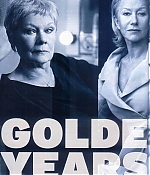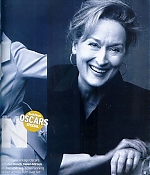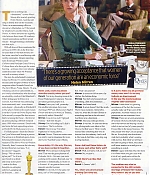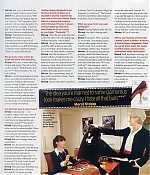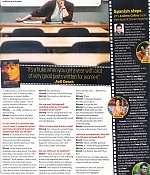|
Simply Streep is your premiere source on Meryl Streep's work on film, television and in the theatre - a career that has won her the praise to be one of the world's greatest working actresses. Created in 1999, we have built an extensive collection to discover Miss Streep's body of work through articles, photos and videos. Enjoy your stay.
|
Celebrating
25 years
of SimplyStreep
|
|
Golden Years
Radio Times ·
February 2007
· Written by Clark Collins
|
“There is nothing like a daaaaame!” croons Meryl Streep after warmly greeting Dame Helen Mirren on this late December morning. And that old song is doubly true on this occasion. Today, in an unassuming office in downtown Manhattan, we’ll be joined by another Dame of the British Empire, Judi Dench. All three actresses are, of course, legends who between them can boast 20 Academy Award nominations and three actual Oscars – though boasting is definitely not their style. The trio’s most recent performances prove that the decades have only sharpened their talents. This year marks the first time in recent history that it’s the Best Actress race, not the Best Actor race, that’s overflowing with worthy contenders. And despite dazzling turns from the likes of Kate Winslet (Little Children), Penélope Cruz (Volver), and Naomi Watts (The Painted Veil), it’s these three who’ve got voters buzzing, the ones who were already established stars when Ms. Winslet was still in kindergarten. She may be unfashionably punctual today, but Streep, 57, coolly inhabited the soul (and designer clothes) of style-magazine editor Miranda Priestly in The Devil Wears Prada. Dench, 72, was villainous, yet never cartoonishly so, as a lonely London schoolteacher who develops an unhealthy crush on Cate Blanchett’s fellow pedagogue in Notes on a Scandal. Finally, Mirren was convincing both emotionally and – to an almost eerie extent – physically as Elizabeth II in the sleeper hit The Queen. Indeed, the smart money is on the 61-year-old Prime Suspect star becoming the first to win an Oscar for playing a British monarch since a certain J. Dench took home a gold man in 1999 for portraying Elizabeth I in Shakespeare in Love. It is Shakespeare’s fault, by the way, that Dame Judi cannot be with us in person today. The actress is awaiting our call in Stratford-upon-Avon, England, where she’s between a matinee and an evening performance of a musical version of The Merry Wives of Windsor. Naturally, there is concern that the woman James Bond calls ”M” may be a little tired from her onstage exertions. ”Let her snooze!” suggests Streep. ”We can make up her part!” As it turns out, however, Dench is as feisty and funny as her Stateside peers as the trio ruminate on outraging audiences and ganging up on directors – not to mention impertinent EW journalists.
Dame Judi, could you please describe for our benefit exactly where you are?
Judi Dench: In my dressing room at the Royal Shakespeare Company. You can just about get four people in it.
Meryl Streep: I saw you, Judi, yesterday. On the satellite television, they were playing [1968’s] A Midsummer Night’s Dream and there you were, practically naked. Beautiful!
Helen Mirren: I was in it as well! I played Hermia – that little fat girl.
Streep: You’re kidding me! I didn’t even know. That’s so divine.
Dench: I have to say I’m rather frightened it’s being shown.
Mirren: I know. There are certain ones you really want to disappear forever, don’t you? And that’s one of them.
Remarkably, it’s the only film on which any of you have worked together.
Mirren: We’re always working with men! That was the great pleasure of Calendar Girls. For once, you’re working with women. But Judi, you’ve just done it, fantastically, in Notes on a Scandal. It’s so great to have a role opposite another woman.
Dench: It is lovely. It’s the same old story, isn’t it? Not enough parts to go around!
Is it fun to go to all these awards ceremonies?
Streep: It’s fun for people who like…that. That’s my answer!
Mirren: It seems so full-on now: the clothes, the fashion thing.
Streep: You feel very honored and everything. [But also] burdened…
Mirren: And humiliated.
Streep: It never doesn’t feel like work. There was a moment I remember, early on, when the Golden Globes or something used to be not televised. And there was a luncheon…
Mirren: And you could get drunk.
Streep: It was fun. Or you read about how photographs were taken at the Oscars, but that was it. Then it really seemed like something that was an honor from the industry. And it still is. But you do feel like a very tiny cog in a big machine.
Dame Judi and Dame Helen, do you know each other fairly well?
Dench: Well, we don’t fairly well, do we?
Mirren: No, we don’t. I know Americans look at Britain as this tiny, tiny country. You must all know each other!
EW: I think there is an idea that there’s…
Dench: A Dames’ club?
Yes, where you all sit around drinking Earl Grey tea.
Dench: No, it’s not like that at all.
Streep: That’s not what we think you sit around drinking. [Laughs]
Is it just a fluke that you have these meaty roles in The Queen, The Devil Wears Prada, and Notes on a Scandal? Or do these films indicate an improvement in the way the movie business regards older actresses?
Mirren: I think there is a growing acceptance of the fact that women actually make up 50 percent of the population. And that women of our generation are an economic force.
Streep: There are several generations of women who have the habit of going out to the movies and buying a ticket, which is not so true [of young people]. It’s just like in the music business. The only people that buy CDs are people like us. Everybody else downloads it illegally off the LimeWire.
And that’s probably what’s coming with movies. But while we still have the habit of going to films, they damn well better market to us and give us something to watch.
Dench: I agree with that. But I do think it’s a fluke when you get a year with a lot of very good parts written for women. It’s whatever is in fashion.
The problem may also be connected to the still-notable shortage of female filmmakers. Why haven’t any of you ever directed a movie?
Mirren: Because we’re actresses!
Streep: Why don’t you drive an airplane?
Mirren: Judi, you’ve directed a couple of times in the theater, haven’t you?
Dench: Yes, about six or seven. With theater directing, they gang up against you, actually. They say, ”We’re going to a pub” – and don’t tell you where the pub is! It’s a really curious thing. You think, I don’t do that. But of course I do do that. I gang up against directors straightaway.
Streep: That’s part of the fun of it.
Dench: Of course it is. And, as a director, you have to get a lot of wayward people over a line at the same point. And that’s very difficult because everybody works at different speeds. I think it’s a really difficult job.
But so many male actors do make the move into directing.
Streep: Well, they’re more unfeeling. Look at Judi talking about ”Oh, they all work at a different pace.” Most directors don’t give a s– about your pace. No, I’m kidding, obviously. I’m kidding!
Mirren: A weird thing happens to male actors, especially movie stars, in my experience. Which is, they become grumpy old men. I think a young male actor feels great. All the girls want him. He’s a star. As they get older, that sense of not being in control of their own destiny sort of grates on them, and they get grumpy. And they move into direction to try and feel they’re in control of their own destiny. Whereas I don’t feel psychologically challenged, because I’m in a collaborative situation on a set with a director.
Do you find directors are ever in awe of you?
Streep: Unfortunately…no! [Laughs] I mean, actors are, I can tell you that. Until the second day when I don’t know my lines and they go, Well, she’s not so f–ing great!
Mirren: I hate being respected, I really do. It makes me feel so uncomfortable. When younger actors come up and say they respect you, you want to go, ”Don’t respect me! I don’t want your respect!”
Streep: But you’re happy when you inspire them.
Mirren: Yes, because I love being inspired by other people. I was thinking about that coming here. It’s interesting for me that Meryl and Judi are the two people that are participating today because they’ve both been incredibly influential on me in terms of ”Oh, God, I wish I could do that. How does she do that?”
Streep: That’s the way I feel about you.
Mirren: But the reality is that you are yourself. Of course, you take inspiration from other people. But in the end you can only be yourself. You have to stumble on in your own way.
Neither Queen Elizabeth II nor Barbara Covett, in Scandal, are exactly glamorous parts. And in Prada there is a memorable scene in which Miranda Priestly is shown in a very real, makeup-free manner. Is it mortifying to be shown in that way, or as an actress, do you think, Fantastic!?
Streep: That’s the part of the film that makes the whole rest of it worth doing. Without that scene, what is there?
Mirren: One of the great advantages of getting older is that you can walk into a world which is more truthful and less to do with other people’s fantasies.
Streep: But I felt the desire to f– around with how I look from the very beginning. And the idea that you’re married to some sort of glamorous look makes me crazy. I hate all that bulls–. I mean, I’ll put on foundation over my pimples, but really it pisses me off.
Mirren: How extraordinary, then, to play in The Devil Wears Prada. That’s what it’s all about.
Streep: My favorite line is Stanley Tucci’s: ”That’s really what this multibillion-dollar industry is all about, isn’t it? Inner beauty!”
What was your first-ever paid acting job?
Dench: Playing Ophelia at the Old Vic.
Streep: Gee, that’s starting small. [Laughs]
Dench: That was in 1957. I got paid 3 pounds, 10 shillings a week. I was sharing with two other people and the rent was 9 pounds a week and we were to give 3 pounds each. So I was left with 10 shillings. What is that nowadays, 50 pence? [Roughly a dollar.]
Mirren: My first paid acting job was in a play called Little Malcolm and His Struggle Against the Eunuchs that I did in a theater that had those seats which would flip up. And I had a line that went, ”Will you shaft me?” Which means ”Will you f– me?” And whenever I said, ”Malcolm, will you shaft me?” at least five seats would go click-click-click-click-click as people left their seats in outrage. The beginning is always the best, isn’t it?
Streep: Right after college I joined a theatrical commune and we played during the summer in Vermont. We made so much money that we decided to go right through the winter and play the ski resorts. And so we would do Chekhov in the ski resorts and, at the end of the first act, the whole front row was snoring. They’d been on the slopes all day and they would snore so loud.
Mirren: We’ve all seen that.
Meryl recently worked with Lindsay Lohan on the late Robert Altman’s A Prairie Home Companion. What do you all think about the media scrutiny young actresses find themselves under these days?
Dench: Well, now there’s nothing you don’t know about people. You can find out everything about everybody and I think that’s a rather eroding thing. I would be put right off if I was coming into the profession now. I wouldn’t like it at all.
Mirren: But, you know, there are actresses – and I suspect that we three were of that ilk – who really operate on a completely different level. They’re just not interested in that. They don’t read the magazines. They’re thinking about Shakespeare or about Chekhov. They’re thinking like actresses, not celebrities. Lindsay Lohan – who is wonderful, actually, on screen – has come into the profession, into the work…
Streep: …as a child, and that’s a very difficult thing.
Mirren: And she loves it. And why shouldn’t she? And she’ll get over it.
You all have these tremendous bodies of filmed work. Do you ever find yourself watching a movie on television having forgotten you’re in it?
Streep: I haven’t forgotten that I was in stuff. I definitely forget the plot. I always watch very interestedly to find out what happens. How does this come out? Does she get out of the car?
Which choice does Sophie make?
Streep: No, I remember certain things. Over Christmas this happened. There was some movie called Falling in Love that Robert De Niro and I made. And my daughters were saying, ”So, what happens? Does he leave the wife?” But I really couldn’t remember.
Do you ever still have to audition for roles?
Dench: I think sometimes we might be without knowing it. If you’re having a kind of friendly meal with somebody and you suddenly see those very beady, gimlet eyes looking at you, you might be auditioning then.
Mirren: I was hopeless at auditioning. I’ve always been inspired by American actors because they have an ability to go straight to an emotional thing. In my early days of being in America, I’d go on an audition-type thing and the American actors would be there doing their role in the waiting room, full out, with…themselves. Full out!
Streep: Yikes.
Mirren: Crying and banging. And then you’d go in…
Streep: And get the job!
Mirren: No, I didn’t. I never got the job.
Dench: Glenda [Jackson] used to do that, when she played Elizabeth I. She used to roar at people.
Mirren: Oh, well, when you’re actually playing the role, that’s a different thing.
Dench: She was just having lunch! I’m going to have to be very rude and go. I’m so sorry.
Just one final question. Who is going to win the Oscar this year for Best Actress?
Dench: I have no idea.
Mirren: That’s a terrible question!
Streep: It’s such a shocking question.
Mirren: We’re going to throttle him!
Dench: You throttle him and I’ll go. Bye!

